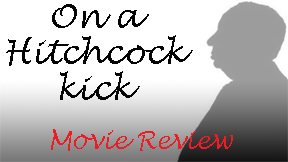“Rope” (1948) makes it onto a lot of Alfred Hitchcock top 10 lists despite being his simplest story. (SPOILERS FOLLOW, in the sense that this movie very much benefits from the viewer knowing nothing going in.)
A condensed version of the Master of Suspense’s trademark brand of high tension, the 80-minute film starts by blatantly showing us a murder, then builds toward the murderers’ potential outing at a dinner party.
In contrast to the story’s simplicity, Hitchcock made “Rope” into a complex technical challenge for himself and the actors. The director uses most of a film camera magazine of that era (10 minutes) without cutting, then disguises a cut by panning over someone’s suit back, then shoots another magazine’s worth. “Rope” is sometimes said to unfold in “one take.”

“Rope” (1948)
Director: Alfred Hitchcock
Writers: Hume Cronyn, Patrick Hamilton, Arthur Laurents
Stars: James Stewart, John Dall, Farley Granger
This aspect of the film is overhyped. Stage actors performing the original version of “Rope” (Patrick Hamilton’s 1929 play) do literal, undisguised long takes, getting only two set breaks. While the “real time” aspect does create urgency, doing “one take” isn’t the only way – nor the best way — to achieve that. And I personally find long takes (if I know about them beforehand) distracting, as I’m nervous on the actors’ behalf about potential flubbed lines.
Building characters on the fly
The actors do a fine job of building their characters within one apartment unit, all from the angle of the “theater seats” as day fades to night in the picture window at the “back of the stage.” Hitchcock does thoughtful in-camera editing, for instance framing one character’s reactions rather than another’s speech. The lighting is memorable: I love the way the neon from the neighboring building’s sign infuses the apartment at dusk. It may be the setting of a horrific act, but it’s a neat place to live.
As Phillip, Farley Granger is a less confident version of the nice guy he’d later play in “Strangers on a Train.” His controlling partner-in-crime Brandon (John Dall) drips with sadistic glee but also has his own anxiety. It’s neat to see the gradual realization by James Stewart’s Rupert that these young men (who the behind-the-scenes features say are a gay couple, although I read them as college roommates who became accidental friends, like in “Sideways”) might be behind the disappearance of the dinner guest who has not shown up.
I’ve heard some reviewers say “Rope” is infused with edge-of-your-seat tension throughout, as the partiers revel around the food-laden trunk containing the body. But I didn’t feel it. For most of the film, there’s no reason for anyone to open the trunk. Once there is a reason – the caterer’s desire to store a pile of books — it’s fairly easily rejected by Brandon.

That’s not to say I wasn’t engrossed. For one, the party banter is engaging, with a particularly grand old-dame turn coming from Constance Collier as Mrs. Atwater. There’s a bit of a love triangle between two guests – plus the deceased — who are friends of Phillip and Brandon but irked at them for putting them in this situation.
A psycho before ‘Psycho’
Most engrossingly, Brandon, Rupert and Mr. Kentley (Cedric Hardwicke) engage in a three-pronged debate about the idea that the privileged class should be allowed to kill members of the lower class. Brandon believes it, Rupert finds it to be a compelling theory and/or a slice of dark humor, and Mr. Kentley is disgusted.
Like many Hitchcock films, “Rope” is a portrait of a psychopath, but this one is relatively flat. Brandon commits a murder simply to see if he can get away with it, a notion Agatha Christie also struggled to understand in “Murder is Easy” (1939). Even though the victim is an absent center (his absence being the concern of all the partygoers), he’s still an unknown, abstract quantity.
That’s how Brandon sees him, too, so theoretically we’d feel complicit with Brandon in a slimy way, but that doesn’t happen. There’s room for emotions as we think about the tragedy of a young man who is incapable of understanding right and wrong; how did he become this way?
Is Rupert partly to blame for the death because of his open theorizing around Brandon, having not realized he’d be taken literally? Stewart’s subtle performance suggests that this thought crosses Rupert’s mind, but that’s the extent of it. Rupert ultimately is a mere audience surrogate, appalled by something obviously appalling.
Rope … I mean, ripe … for a remake?
A remake (especially one not concerned with being a technical show-off) could come at these concepts from more off-kilter angles – although one could argue there’s no need, as Hitchcock himself later dug deeper into sympathetic psychopaths, notably in “Psycho.” Plus, there are other films likewise inspired by the 1924 Leopold and Loeb murder. Notable to horror fans is the original “Scream,” wherein the intelligent villains embrace their psychopathy and see murder as a creative art.
“Rope” passes on opportunities for extra suspense or thrilling sequences, and the set (which had to be big enough to accommodate a camera and have movable walls) is not at all claustrophobic. At one point, Phillip is behind Rupert and could theoretically attack him and escalate the drama; Hitchcock perhaps purposely frames the shot so we consider this possibility. But Phillip simply mopes at the piano while Rupert converses with Brandon.
“Rope” is both a technical exercise and a moral thought experiment. The former aspect is mastered. The latter is more interesting to me, but it doesn’t go as far as it could. While it might strain credulity for two people to undergo life-altering character arcs in 80 minutes, they’ve literally committed a life-altering act, so I think there’s room for the drama to be punched up.
I like “Rope” slightly less than most Hitchcock scholars do, but I admire the technical achievement and the film’s place in history.
RFMC’s Alfred Hitchcock series reviews works by the Master of Suspense, plus remakes and source material. Click here to visit our Hitchcock Zone.

